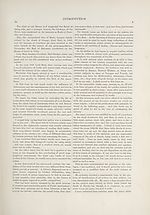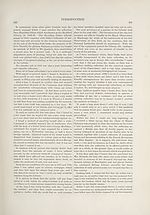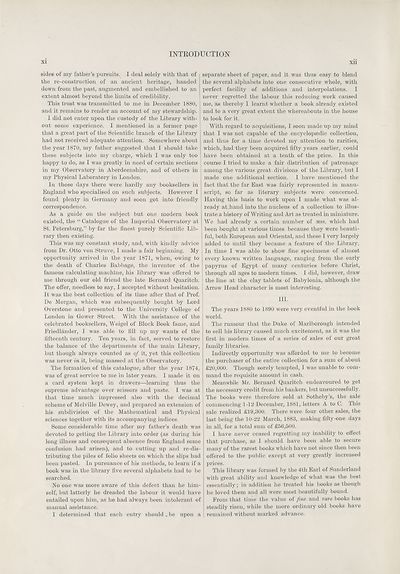Catalogue of the printed books preserved at Haigh Hall, Wigan, Co. Pal. Lancast > A--D
(16) Columns xi and xii
‹‹‹ prev (15)
Columns ix and x
(17) next ›››
Columns xiii and xiv
Download files
Complete book:
Individual page:
Thumbnail gallery: Grid view | List view

INTRODUCTION
XI
Xll
sides of my father's pursuits. I deal solely with that of
the re-construction of an ancient heritage, handed
down from the past, augmented and embellished to an
extent almost beyond the limits of credibility.
This trust was transmitted to me in December 1880,
and it remains to render an account of my stewardship.
I did not enter upon the custody of the Library with¬
out some experience. I mentioned in a former page
that a great part of the Scientific branch of the Library
had not received adequate attention. Somewhere about
the year 1870, my father suggested that I should take
these subjects into my charge, which I was only too
happy to do, as I was greatly in need of certain sections
in my Observatory in Aberdeenshire, and of others in
my Physical Laboratory in London.
In those days there were hardly any booksellers in
England who specialised on such subjects. However I
found plenty in Germany and soon got into friendly
correspondence.
As a guide on the subject but one modern book
existed, the " Catalogue of the Imperial Observatory at
St. Petersburg," by far the finest purely Scientific Lib¬
rary then existing.
This was my constant study, and, with kindly advice
from Dr. Otto von Struve, I made a fair beginning. My
opportunity arrived in the year 1871, when, owing to
the death of Charles Babbage, the inventor of the
famous calculating machine, his library was ofi"ered to
me through our old friend the late Bernard Quaritch.
The offer, needless to say, I accepted without hesitation.
It was the best collection of its time after that of Prof.
De Morgan, which was subsequently bought by Lord
Overstone and presented to the University College of
London in Gower Street. With the assistance of the
celebrated booksellers, Weigel of Block Book fame, and
Friedlander, I was able to fill up my wants of the
fifteenth century. Ten years, in fact, served to restore
the balance of the departments of the main Library,
but though always counted as of it, yet this collection
was never in it, being massed at the Observatory.
The formation of this catalogue, after the year 1874,
was of great service to me in later years. I made it on
a card system kept in drawers—learning thus the
supreme advantage over scissors and paste. I was at
that time much impressed also with the decimal
scheme of Melville Dewey, and prepared an extension of
his subdivision of the Mathematical and Physical
sciences together with its accompanying indices.
Some considerable time after my father's death was
devoted to getting the Library into order (as during his
long illness and consequent absence from England some
confusion had arisen), and to cutting up and re-dis¬
tributing the piles of folio sheets on which the slips had
been pasted. In pursuance of his methods, to learn if a
book was in the library five several alphabets had to be
searched.
No one was more aware of this defect than he him¬
self, but latterly he dreaded the labour it would have
entailed upon him, as he had always been intolerant of
manual assistance.
I determined that each entry should . be upon a
separate sheet of paper, and it was thus easy to blend
the several alphabets into one consecutive whole, with
perfect facility of additions and interpolations. I
never regretted the labour this reducing work caused
me, as thereby I learnt whether a book already existed
and to a very great extent the whereabouts in the house
to look for it.
With regard to acquisitions, I soon made up my mind
that I was not capable of the encyclopajdic collection,
and thus for a time devoted my attention to rarities,
which, had they been acquired fifty years earlier, could
have been obtained at a tenth of the price. In this
course I tried to make a fair distribution of patronage
among the various great divisions of the Library, but I
made one additional section. I have mentioned the
fact that the far East was fairly represented in manu¬
script, so far as literary subjects were concerned.
Having this basis to work upon I made what was al¬
ready at hand into the nucleus of a collection to illus¬
trate a history of Writing and Art as treated in miniature.
We had already a certain number of mss. which had
been bought at various times because they were beauti¬
ful, both European and Oriental, and these I very largely
added to until they became a feature of the Library.
In time I was able to show fine specimens of almost
every known written language, ranging from the early
papyrus of Egypt of many centuries before Christ,
through all ages to modern times. I did, however, draw
the line at the clay tablets of Babylonia, although the
Arrow Head character is most interesting.
III.
The years 1880 to 1890 were very eventful in the book
world.
The rumour that the Duke of Marlborough intended
to sell his library caused much excitement, as it was the
first in modern times of a series of sales of our great
family libraries.
Indirectly opportunity was aff"orded to me to become
the purchaser of the entire collection for a sum of about
£20,000. Though sorely tempted, I was unable to com¬
mand the requisite amount in cash.
Meanwhile Mr. Bernard Quaritch endeavoured to get
the necessary credit from his bankers, but unsuccessfully.
The books were therefore sold at Sotheby's, the sale
commencing 1-12 December, 1881, letters A to C. This
sale realized £19,300. There were four other sales, the
last being the 10-22 March, 1883, making fifty-one days
in all, for a total sum of £56,500.
I have never ceased regretting my inability to effect
that purchase, as I should have been able to secure
many of the rarest books which have not since then been
offered to the public except at very greatly increased
prices.
This library was formed by the 4th Earl of Sunderland
with great ability and knowledge of what was the best
essentially; in addition he treated his books as though
he loved them and all were most beautifully bound.
From that time the value of fine and rare books has
steadily risen, while the more ordinary old books have
remained without marked advance.
XI
Xll
sides of my father's pursuits. I deal solely with that of
the re-construction of an ancient heritage, handed
down from the past, augmented and embellished to an
extent almost beyond the limits of credibility.
This trust was transmitted to me in December 1880,
and it remains to render an account of my stewardship.
I did not enter upon the custody of the Library with¬
out some experience. I mentioned in a former page
that a great part of the Scientific branch of the Library
had not received adequate attention. Somewhere about
the year 1870, my father suggested that I should take
these subjects into my charge, which I was only too
happy to do, as I was greatly in need of certain sections
in my Observatory in Aberdeenshire, and of others in
my Physical Laboratory in London.
In those days there were hardly any booksellers in
England who specialised on such subjects. However I
found plenty in Germany and soon got into friendly
correspondence.
As a guide on the subject but one modern book
existed, the " Catalogue of the Imperial Observatory at
St. Petersburg," by far the finest purely Scientific Lib¬
rary then existing.
This was my constant study, and, with kindly advice
from Dr. Otto von Struve, I made a fair beginning. My
opportunity arrived in the year 1871, when, owing to
the death of Charles Babbage, the inventor of the
famous calculating machine, his library was ofi"ered to
me through our old friend the late Bernard Quaritch.
The offer, needless to say, I accepted without hesitation.
It was the best collection of its time after that of Prof.
De Morgan, which was subsequently bought by Lord
Overstone and presented to the University College of
London in Gower Street. With the assistance of the
celebrated booksellers, Weigel of Block Book fame, and
Friedlander, I was able to fill up my wants of the
fifteenth century. Ten years, in fact, served to restore
the balance of the departments of the main Library,
but though always counted as of it, yet this collection
was never in it, being massed at the Observatory.
The formation of this catalogue, after the year 1874,
was of great service to me in later years. I made it on
a card system kept in drawers—learning thus the
supreme advantage over scissors and paste. I was at
that time much impressed also with the decimal
scheme of Melville Dewey, and prepared an extension of
his subdivision of the Mathematical and Physical
sciences together with its accompanying indices.
Some considerable time after my father's death was
devoted to getting the Library into order (as during his
long illness and consequent absence from England some
confusion had arisen), and to cutting up and re-dis¬
tributing the piles of folio sheets on which the slips had
been pasted. In pursuance of his methods, to learn if a
book was in the library five several alphabets had to be
searched.
No one was more aware of this defect than he him¬
self, but latterly he dreaded the labour it would have
entailed upon him, as he had always been intolerant of
manual assistance.
I determined that each entry should . be upon a
separate sheet of paper, and it was thus easy to blend
the several alphabets into one consecutive whole, with
perfect facility of additions and interpolations. I
never regretted the labour this reducing work caused
me, as thereby I learnt whether a book already existed
and to a very great extent the whereabouts in the house
to look for it.
With regard to acquisitions, I soon made up my mind
that I was not capable of the encyclopajdic collection,
and thus for a time devoted my attention to rarities,
which, had they been acquired fifty years earlier, could
have been obtained at a tenth of the price. In this
course I tried to make a fair distribution of patronage
among the various great divisions of the Library, but I
made one additional section. I have mentioned the
fact that the far East was fairly represented in manu¬
script, so far as literary subjects were concerned.
Having this basis to work upon I made what was al¬
ready at hand into the nucleus of a collection to illus¬
trate a history of Writing and Art as treated in miniature.
We had already a certain number of mss. which had
been bought at various times because they were beauti¬
ful, both European and Oriental, and these I very largely
added to until they became a feature of the Library.
In time I was able to show fine specimens of almost
every known written language, ranging from the early
papyrus of Egypt of many centuries before Christ,
through all ages to modern times. I did, however, draw
the line at the clay tablets of Babylonia, although the
Arrow Head character is most interesting.
III.
The years 1880 to 1890 were very eventful in the book
world.
The rumour that the Duke of Marlborough intended
to sell his library caused much excitement, as it was the
first in modern times of a series of sales of our great
family libraries.
Indirectly opportunity was aff"orded to me to become
the purchaser of the entire collection for a sum of about
£20,000. Though sorely tempted, I was unable to com¬
mand the requisite amount in cash.
Meanwhile Mr. Bernard Quaritch endeavoured to get
the necessary credit from his bankers, but unsuccessfully.
The books were therefore sold at Sotheby's, the sale
commencing 1-12 December, 1881, letters A to C. This
sale realized £19,300. There were four other sales, the
last being the 10-22 March, 1883, making fifty-one days
in all, for a total sum of £56,500.
I have never ceased regretting my inability to effect
that purchase, as I should have been able to secure
many of the rarest books which have not since then been
offered to the public except at very greatly increased
prices.
This library was formed by the 4th Earl of Sunderland
with great ability and knowledge of what was the best
essentially; in addition he treated his books as though
he loved them and all were most beautifully bound.
From that time the value of fine and rare books has
steadily risen, while the more ordinary old books have
remained without marked advance.
Set display mode to: Large image | Transcription
Images and transcriptions on this page, including medium image downloads, may be used under the Creative Commons Attribution 4.0 International Licence unless otherwise stated. ![]()
| Bibliotheca Lindesiana catalogues > Catalogue of the printed books preserved at Haigh Hall, Wigan, Co. Pal. Lancast > A--D > (16) Columns xi and xii |
|---|
| Permanent URL | https://digital.nls.uk/105899984 |
|---|
| Attribution and copyright: |
|
|---|---|
| Description | Privately printed catalogues of the special collections of the Bibliotheca Lindesiana, the family library of the Earls of Crawford and Balcarres. Reformation Tracts, English Newspapers and De Bry Collection catalogues provide the only record of the contents of these collections. Also include catalogues of Bibliotheca Lindesiana collections now held elsewhere. |
|---|